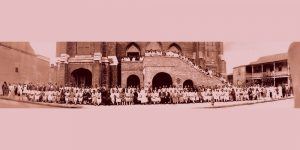Brit Bennett at The Paris Review:
 Ten days after a white supremacist carried a gun into a black Charleston church, I was in Los Angeles, listening to a black minister preach about the end of the world. A coincidence of timing, maybe, although the message seemed apt. What could be more apocalyptically evil than a racist massacre within the hallowed walls of a church, an angry young man sitting through a Bible study before slaughtering the nine strangers who had invited him in to pray? Yet on that Sunday, when the pastor talked about the end, he did not mention Charleston or the seven black churches that had been burned throughout the South in the immediate aftermath. Instead, he spoke about fornication. “M-hm,” a woman behind me chimed in, “and gay marriage.” The ladies beside her murmured their assent. Just the day before, the Supreme Court had legalized same-sex marriage, a decision that seemed to disturb the congregation more than anything that had happened in Charleston. I didn’t understand it. How could marriage equality be a sign of the impending apocalypse, but not a church shooting? How could the evils of fornication be a more pressing topic than the wave of racial violence affecting the very congregation sitting in the pews?
Ten days after a white supremacist carried a gun into a black Charleston church, I was in Los Angeles, listening to a black minister preach about the end of the world. A coincidence of timing, maybe, although the message seemed apt. What could be more apocalyptically evil than a racist massacre within the hallowed walls of a church, an angry young man sitting through a Bible study before slaughtering the nine strangers who had invited him in to pray? Yet on that Sunday, when the pastor talked about the end, he did not mention Charleston or the seven black churches that had been burned throughout the South in the immediate aftermath. Instead, he spoke about fornication. “M-hm,” a woman behind me chimed in, “and gay marriage.” The ladies beside her murmured their assent. Just the day before, the Supreme Court had legalized same-sex marriage, a decision that seemed to disturb the congregation more than anything that had happened in Charleston. I didn’t understand it. How could marriage equality be a sign of the impending apocalypse, but not a church shooting? How could the evils of fornication be a more pressing topic than the wave of racial violence affecting the very congregation sitting in the pews?
more here.
